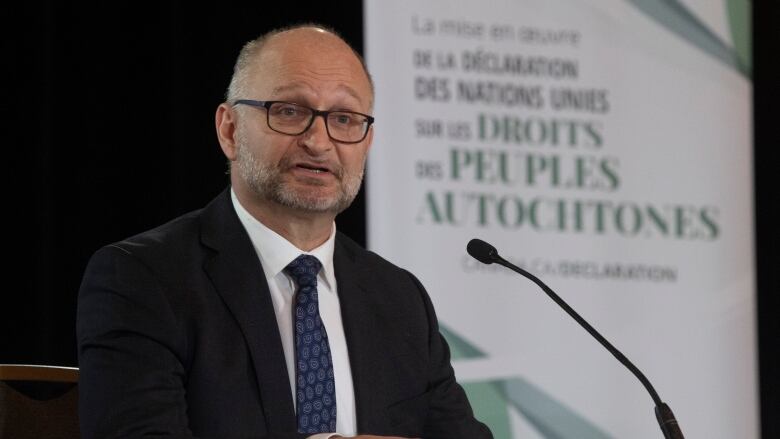Ottawa allocates cash to tackle overepresentation of Red River Mtis in Manitoba justice system
Data on Mtis incarceration rate in Manitoba remains sparse

The Canadian government is earmarking money for the Manitoba Mtis Federation (MMF) to tackle the overrepresentation of Red River Mtis in the province's justice system.
The disproportionate number of Indigenous people locked up in Canadian federal prisons has been well documented, but numbers specific to Mtis in Manitoba, or in any other province, are hard to come by.
That gap in the data is one of several issues a five-year, $1.68-million cash allocation announced Tuesday by Justice Minister David Lametti promises to address.
MMF President David Chartrand, speaking along withLametti at a virtual news conference, said it's a "guessing game" trying to determine how many Indigenous prisoners in Manitoba are Mtis, rather than First Nations or Inuit.
"It's been a challenge. No one seems to want to collect the data," said Chartrand, adding that the federation has sought this information for decades.
"We don't know the ratio but we definitely know there's a crime concern in our villages right now that's starting to grow," he said.
According to a 2004 Correctional Service of Canada report, Mtis offenders accounted for four per cent of the prison population but only one per cent of the general population.
Since then there has been an increase in the number of people identifying as Mtis.
The money will go toward MMF initiatives includingtwo community justice programs,a new mediation service, development ofnew training and education resources, and development ofpart of an overall Indigenous Justice Strategy.
It comes via the federal Indigenous Justice Program, where last spring the Liberal government injected$10 million to help address the increasing overincarceration of Indigenous people in Canada over the next four years.
'One of Canada's most pressing human rights issues'
These numbers have increased steadily over the last decade, something Correctional Investigator Ivan Zinger has tracked with rising alarm.
Zinger, the country's prison ombudsman, issued a statement last December urging "much bolder and swifter reforms" as the number of Indigenous women behind bars neared 50 per cent of the overall female prison population.
Zinger also noted Indigenous women and men accounted for 32 per cent combined or just less than one third of the federal penitentiary population, despite comprising less than five per cent of the general population.
"On this trajectory, assuming overall declines in new admissions to custody, Canada will reach historic and unconscionable levels of Indigenous concentration in federal penitentiaries," Zinger's release warned.
"Overrepresentation of Indigenous people in correctional settings remains one of Canada's most pressing human rights issues, and is evidence of public policy failures over successive decades as no government has been able to stop or reverse this trend."
In Manitoba, three out of four people admitted into federal custody in 2019 were Indigenous, while the comparable countrywide average was about one in three, according to Statistics Canada. Indigenous adults represented16 per centof the population in Manitoba and 14 per centof the population in Saskatchewan.
Minister defends record
In response to calls for more urgent reform, Lamettidefended his government's record and told reportersthe Liberals haveput "one major part of the puzzle" in place by tablingBill C-5, currently before the Senate.
If passed, C-5 would repeal certain mandatory minimum penalties thatimpose mandatory prison time on people convicted for certain offences.
"We are trying to attack this very serious problem," Lametti said.
"We accept that it's a serious problem, and hopefully within a few years we'll begin to see a real turnaround."
However, Bill C-5 has its critics who dispute Lametti's claims.
Sen. Kim Pate and former senator Murray Sinclair issued a news release earlier this year calling for an overhaul to the bill, saying it "will not" address systemic racism in the sentencing regime.
Clarifications
- A previous version of this article described the Indigenous incarceration rate in Manitoba as "more disproportionate, which was inaccurate. In Manitoba, the population of Indigenous people in the prison system is 4.7 times what it is in the general population, whereas in Canada as a whole it is 6.4 times higher. The article was updated accordingly.Oct 20, 2022 3:58 PM ET












_(720p).jpg)


 OFFICIAL HD MUSIC VIDEO.jpg)
.jpg)



























































































